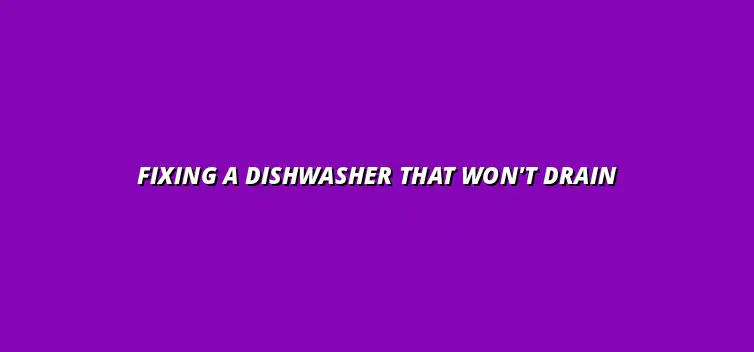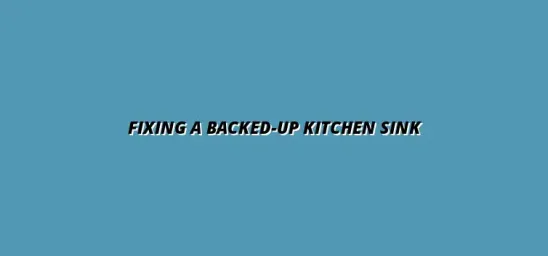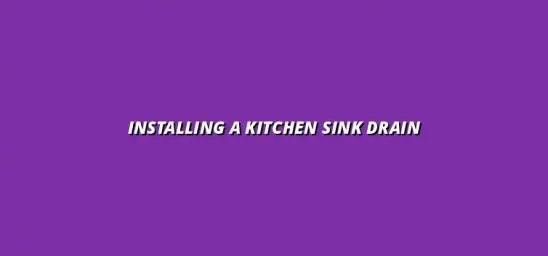
Fixing a Dishwasher That Won't Drain
Understanding Dishwasher Drainage Issues
When your dishwasher isn't draining properly, it can lead to a range of problems. Understanding what might be causing these issues is the first step toward finding a solution. From standing water to unpleasant smells, there are several signs that indicate your dishwasher needs attention.
In this section, we'll explore common symptoms of a dishwasher that won’t drain, potential consequences, and how to recognize these problems early. This knowledge will help you keep your dishwasher in top condition and avoid costly repairs!
Common Symptoms of a Dishwasher That Won't Drain
One of the first signs that your dishwasher might be having drainage issues is the presence of standing water at the bottom. This can happen for a variety of reasons, including clogged filters or a blocked drain hose. Here are some key symptoms to look out for:
- Standing water after a cycle
- Unpleasant odors emanating from the dishwasher
- Unclean dishes after washing
- Warning lights on the dishwasher display
Identifying Standing Water and Its Causes
Standing water is often a clear indicator of a drainage problem. If you notice water pooling at the bottom of your dishwasher, it could be due to a clogged filter, blocked drain hose, or even an issue with the drain pump. Regularly checking for and addressing these issues can prevent bigger problems down the line. For tips on unclogging drains elsewhere in your home, check out this helpful guide on how to unclog a bathroom drain.
To manage standing water effectively, make a habit of inspecting the filter regularly. If you see any build-up of food particles or debris, clean it out to ensure proper drainage. Being proactive will help you maintain the efficiency of your dishwasher!
Recognizing Unpleasant Odors and Their Implications
If your dishwasher starts to emit unpleasant odors, it's often a sign that something is wrong. These smells can be caused by stagnant water, food residue, or mold growth inside the appliance. It’s essential to address these odors promptly to avoid further complications.
Regular cleaning can help keep your dishwasher smelling fresh. I recommend using a mixture of vinegar and baking soda to clean the interior and eliminate odors. This simple solution not only fights unpleasant smells but also helps maintain the cleanliness of your appliance!
Potential Consequences of a Dishwasher Not Draining
If you ignore drainage issues, it can lead to several serious consequences. Your dishes may not be cleaned properly, which can pose health risks. Additionally, neglecting these problems can lead to more expensive repairs or even the need for a new dishwasher. Addressing plumbing issues promptly can save you money in the long run; for example, learn how to repair a leaky kitchen sink to avoid larger problems.
Recognizing the importance of timely maintenance can save you both money and hassle in the long run. Let’s look at some of the potential consequences of a dishwasher that won’t drain!
Impact on Dish Cleanliness and Hygiene
When your dishwasher doesn’t drain, it can leave food particles and grease on your dishes. This not only affects the appearance of your dishes but also can pose health risks, as bacteria can thrive in stagnant water. Therefore, ensuring that your dishwasher drains properly is crucial for maintaining a hygienic kitchen.
Additionally, you might find yourself having to wash dishes by hand if your dishwasher is not functioning well. This can be time-consuming and inconvenient, especially after a long day of cooking!
Effects on Appliance Lifespan and Maintenance Costs
Ignoring drainage issues can shorten the lifespan of your dishwasher. When the appliance works harder to drain water, it puts extra strain on its components, leading to potential breakdowns. Regular maintenance and prompt attention to drainage issues can help prolong the life of your dishwasher. Regular drain cleaning is essential for maintaining optimal plumbing performance; discover the benefits of regular drain cleaning for your kitchen and more.
Addressing these problems early can also save you money on repairs. A small issue that is fixed in time can prevent a bigger, more expensive problem later on. Remember, a little TLC goes a long way!
Preventative Measures to Avoid Drainage Problems
Taking care of your dishwasher can save you from many headaches down the road! By investing a little time in preventative maintenance, you can help ensure that your appliance runs smoothly and avoids common drainage issues. Let’s dive into some effective practices that can keep your dishwasher in tip-top shape!
First and foremost, regular cleaning should be part of your routine. This means not only cleaning the inside and outside of the appliance but also focusing on specific areas that can lead to drainage problems. Keeping your dishwasher clean minimizes the risk of buildup that can clog the system and cause water to collect. Understanding your water heater's temperature is also crucial for efficient appliance operation. Learn more in this guide on water heater temperature troubleshooting.
Routine Maintenance Practices for Optimal Performance
To get the most out of your dishwasher, follow these maintenance tips:
- Run a cleaning cycle monthly using a dishwasher cleaner.
- Wipe down the door seals and gaskets.
- Check and clean the filters regularly to avoid clogs.
- Inspect the spray arms for any debris that may obstruct water flow.
Additionally, managing how you load the dishwasher can make a significant difference. Make sure that dishes are arranged properly so that water can reach all surfaces effectively. This will help prevent dirty dishes from piling up and reduce drainage issues!
Regular Cleaning Tips for Your Dishwasher
Here are some specific cleaning tasks to keep your dishwasher functioning well:
- Remove and clean the filter, rinsing it under warm water.
- Use vinegar to clean the interior and remove odor.
- Run a hot water cycle to help dislodge any buildup.
By incorporating these cleaning habits, you can help maintain optimal performance and prolong the life of your dishwasher. Less stress for you, and a cleaner appliance!
Best Practices for Load Management
Effective load management is essential to ensure that your dishwasher operates efficiently. Here are some best practices to consider:
- Place larger items on the bottom rack and smaller items on the top.
- Avoid overloading, as this can block spray arms.
- Space items apart to promote water flow and proper cleaning.
Following these tips can help you avoid drainage problems and ensure that your dishes come out clean every time. It’s all about balancing efficiency and cleanliness!
Understanding Common Misuse Scenarios
Sometimes, we might unknowingly misuse our dishwashers, which can lead to drainage problems. Being aware of these scenarios can help you avoid common pitfalls that damage your appliance and affect its functionality. Low kitchen water pressure can also impact dishwasher performance. Here's how to fix low kitchen water pressure.
One key aspect is to avoid washing certain items in the dishwasher. For example, items like wooden utensils, cast iron pans, or even delicate glassware can break or warp in the dishwasher. Paying attention to what you load can make a big difference in avoiding drainage issues!
Identifying Items That Should Not Be Washed in a Dishwasher
Here’s a quick list of items that should generally be avoided:
- Wooden items (e.g., cutting boards, utensils)
- Non-stick pans (they can lose their coating)
- Crystal glassware (it may become cloudy)
By steering clear of these items, you’ll keep your dishwasher in better shape and reduce the risk of clogs that can lead to drainage issues!
Recognizing Signs of Overloading and Its Impact on Drainage
Overloading your dishwasher might seem like a good way to save time, but it can actually lead to problems. If you notice that your dishes are not being cleaned properly or that water is pooling at the bottom, you might be overloading the machine. Here are some common signs to look out for:
- Dirty spots or residue on dishes after a cycle.
- Water remaining in the bottom after a wash.
- Squeaky or noisy operation during washing.
Recognizing these signs early can help you make adjustments to your loading habits and prevent drainage issues!
Seeking Professional Help for Persistent Issues
Despite our best efforts, sometimes problems persist, and that’s when it might be time to call in a professional. Knowing when to seek help can save you time and money in the long run. For plumbing issues in Birmingham, consider contacting a local plumber such as PlumbProCare in Billesley, Birmingham.
If you’ve tried all the troubleshooting tips and still experience drainage issues, it’s essential to consider contacting a technician. They can diagnose complex problems that might be affecting your appliance’s functionality.
When to Consider Calling a Technician
Here are some situations where you should think about seeking professional assistance:
- Repeated drainage problems despite maintenance efforts.
- Strange noises or water leaks coming from the unit.
- Persistent error codes displayed on the control panel.
These issues often require expert knowledge and tools to properly address, helping you avoid further damage!
Identifying Complex Problems That Require Expert Assistance
Complex problems can be tricky to diagnose. If you notice:
- A malfunctioning drain pump that doesn’t respond.
- Control board errors that prevent proper operation.
- Physical damage to the appliance or plumbing connections.
In these cases, it’s best to leave it to the experts who can provide the right solutions. If you're dealing with a clogged toilet, this guide on fixing a clogged toilet might be helpful.
Understanding Potential Costs and Repair Options
Before contacting a professional, it’s good to know what to expect regarding costs. Repair prices can vary based on the issue and the parts needed, but here are some typical expenses:
- Drain pump replacement: Typically ranges from $150 to $300.
- Control board repairs: Can cost between $200 and $600.
- Service fees for technician visits: Usually around $75 to $150.
Having this information can help you prepare for potential repairs and understand your options!
Frequently Asked Questions Related to Dishwasher Drainage
Many of us have questions when it comes to dishwasher drainage issues. Here are some frequently asked questions that might help clarify any concerns you may have!
How Can I Tell If My Dishwasher Needs Repair?
Some signs your dishwasher may need repair include:
- Water not draining at all or draining slowly.
- Persistent bad smells even after cleaning.
- Unusual noises during operation.
If you notice any of these, it’s a good idea to investigate further!
What Are the Most Common Dishwasher Drainage Problems?
Common problems include:
- Clogged filters or drain hoses.
- Malfunctioning drain pumps.
- Issues with garbage disposal connections.
By understanding these problems, you can take steps to address them effectively!
Final Thoughts on Keeping Your Dishwasher in Top Condition
In summary, taking preventative measures and maintaining your dishwasher can go a long way in avoiding drainage issues. Regular cleaning, proper loading practices, and being aware of misuse can help your appliance run efficiently.
Remember, if problems persist, don’t hesitate to reach out to professionals who can help restore your dishwasher’s functionality. A little effort now can save you a lot of trouble later!
Summarizing Key Steps to Fixing Drainage Issues
To keep your dishwasher running smoothly:
- Perform regular cleaning and maintenance.
- Avoid overloading and using inappropriate items.
- Seek professional help when necessary.
By following these steps, you can maintain a functional and efficient dishwasher for years to come!
Encouraging Regular Maintenance for Longevity
Regular maintenance is key to avoiding costly repairs. Make it a habit to perform cleaning tasks and check for common issues. Your dishwasher will thank you with better performance and longevity!





Fixing a Backed-Up Kitchen Sink
Prepare Your Plumbing for Weather
Installing a Kitchen Sink Drain
When to Replace Plumbing Fixtures
Fixing a Jammed Garbage Disposal